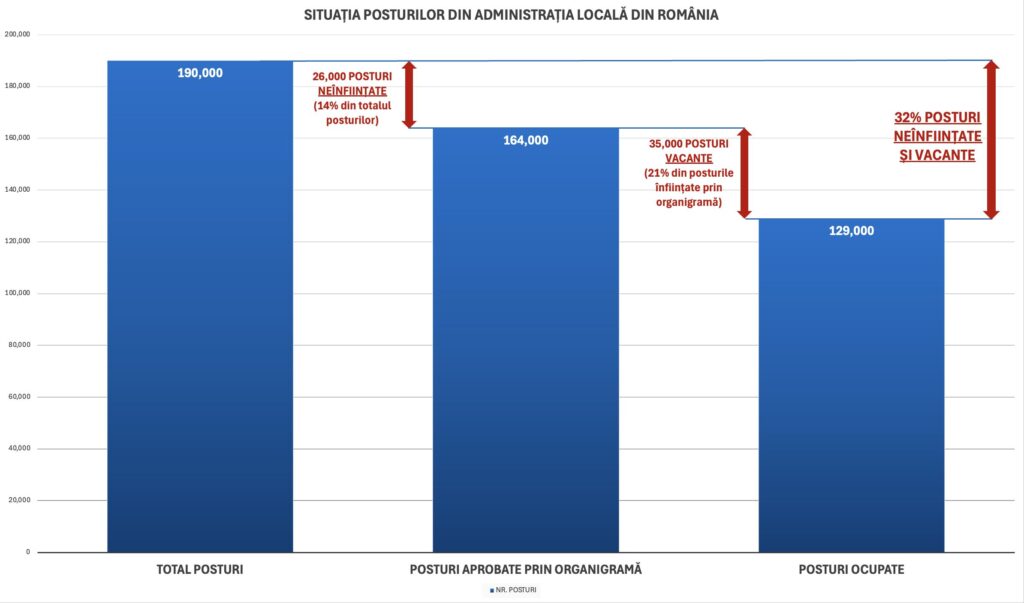Prime Minister Ilie Bolojan spoke on Tuesday about assuming responsibility in Parliament for the 5 draft laws and the measures regarding local public administration, on which the coalition failed to reach an agreement.
Bolojan specified that the project aimed at reforming local public administration was not submitted because the coalition parties did not reach a consensus on measures regarding administration employees.
The Prime Minister warned that, if the state does not reduce personnel expenses, "especially where they are unnecessary," there is a risk that all additional budget revenues will go towards these expenses, and Romania may find itself next year in the same situation as it is now.
He described the area of local public administration as "a large block of expenses that gathers over 150,000 people" employed in their own apparatuses and in social assistance.
- Bolojan Government Assumes Responsibility for Package II of Measures: Do We Want Waste, Exceptions, and Sinecures? Is this the Romania we desire? (Video)
- Public Administration Reform Postponed at PSD's Request. Coalition Fails to Agree on Job Cuts
Bolojan also mentioned that, although no new hirings were made this year, personnel expenses in administration increased by 10% compared to the first six months of last year, although theoretically, they should have decreased by 5%, according to the budget project.
"Without measures in administration, with staff reductions, Package II is incomplete and it is not normal to take money from citizens and put it into a black hole of unjustified administration expenses. As Prime Minister, I cannot endorse such a situation," said Bolojan.
According to the Prime Minister, the proposal of the Ministry of Development to reduce the maximum number of positions by 25% was a fake, with no actual effects.
Thus, Bolojan presented a chart with simulations for effective staff reductions:
- for a 5% reduction, at least a 30% reduction in the maximum number is needed, affecting under 1000 out of the 3200 administrative units.
- for a 10% reduction, a 40% reduction in the maximum number is required, meaning that staff reductions should be made in half of Romania's administrative units.
- for a 15% reduction, a 45% reduction is needed, in nearly 2000 administrative units, so reductions need to be made in 60% of them.
The Prime Minister emphasized that if expenses are kept under control and the proposed fiscal measures are implemented, there will be no need for an increase in VAT or other taxes starting next year.
Spotmedia.ro presented, in LIVE TEXT format, the statements of Prime Minister Ilie Bolojan:
- Two months have passed since this government took office last week. We found that the situation was much more challenging than we had known.
- Since then, we have adopted several measures to reduce the deficit, attract EU funds, and correct injustices.
- The first package addressed some issues, while the second reduces privileges in the public sector. We strengthen the state's ability to collect taxes and levies from those who have avoided doing so, and we bring order to healthcare, where despite investments, the impact is not felt.
- This Package 2, consisting of 5 projects, was supposed to be complemented by a sixth, but we did not reach an agreement, so it was not submitted.
- Regarding expenses, I would like to emphasize the major blocks, as the area of local public administration is a significant expense block that includes over 130,000 people, some in their own apparatuses and some in social assistance.
- In the first six months of this year, personnel expenses increased by 10% compared to the first six months of last year, despite the planned 5% decrease. Not even vacant positions were abolished.
- Reform is absolutely necessary in the area of local public administration. Municipalities cannot sustain their personnel expenses; they receive funds from the state.
- The package on administration reform had three important directions. The increase in administrative capacity had everyone's agreement. Decentralization also had support for transfers to municipalities. However, there was no agreement on staff reductions.
- In recent days, you have heard many figures. Administration is sized based on a large number of positions relative to the population. Each locality in Romania knows, through calculations received from county prefectures, how many maximum employees it can have.
- Knowing the maximum number allowed, each authority, upon the mayor's or county president's proposal, approves the organizational chart. These should be smaller than the large number of employees. In many localities, many mayors have calculated their organizational chart well below the maximum number.
- The third element is the actual number of positions filled. In each institution, some positions are filled, some are vacant. Vacant positions support chief positions. If we want to talk about reductions in administration, we need to focus on the number of positions actually filled.
- The approved maximum number of positions is nearly 190,000. The total approved positions in organizational charts are 164,000. The actual number of filled positions is 129,000. Therefore, there is a difference of 32%.
- Reducing the approved maximum number of positions by 25% means no actual reduction. When the Ministry of Development proposed a 25% reduction, it was understood that the effects were null because only vacant positions were eliminated. I cannot present such solutions to citizens.

- I proposed a fair analysis of the administration. You will have a link with all these public calculations, and you will see the number of positions and staff reduction simulations for each county and locality. You will see who needs to make reductions and who is correct and does not need to.
- If we aim for an effective 5% staff reduction, it means a 30% reduction in the approved maximum number of positions. In this scenario, staff reductions should be made in fewer than 1,000 localities.
- For an effective 10% reduction, it requires a reduction of about 40% in the approved maximum number of positions. This means that staff reductions should be made in half of the municipalities.
- For a 15% effective staff reduction, it means a reduction of about 45% in the approved maximum number of positions. In this scenario, 60% of municipalities should make reductions.
- A 10% reduction means approximately 13,000 layoffs. The Ministry of Development will provide all field data this week.
- The staff reduction hypotheses were based only on two foundations: the number of employees and the number of local police. Considering that there are many cases of municipalities with correctly calculated staff, it means that other municipalities have the opportunity to analyze. Not wasting the money collected from citizens is a significant stake.
- Without measures in administration, with staff reductions, Package II is incomplete, and it is not normal to take money from citizens and put it into a black hole of unjustified administration expenses. As Prime Minister, I cannot endorse such a situation.
- This package must be followed in parallel by reductions in central administration. We conducted an analysis on a primary authority, the Consumer Protection Authority. We found that with a 20% reduction in positions, things can function at least as well. An analysis must be conducted for each central authority.
Questions:
- Is Nicușor Dan a partner or a hindrance?
The coalition parties and the president must be and are the president's partners. All measures implemented are done with the parties' agreement. It is never easy to agree on details, but I believe we have the wisdom to do what is necessary for Romania. There is no issue; it is a normal dialogue with the president.
- Have you told the Coalition partners that if you do not reach an agreement, you will resign?
I conveyed that we had an understanding, that we have a governance program based on which I accepted this responsibility. There was not much hesitation for the position of Prime Minister when the Romanian Government was formed. To be able to exercise, the component of expense reduction, including in administration, and governmental solidarity are important. It is evident that if these aspects are maintained, political stability is crucial and must be taken into account. If these aspects are not respected, meaning to honor our agreements and do what is necessary for Romania, it is difficult to exercise this position; otherwise, you occupy a position without leveraging it for the community or our country in this case.
- Is there stability in the coalition?
It will be seen with the motions of censure, if they are submitted.
- The President asked you for transitional rules for magistrates' pensions to be 15 years, but you kept it at 10 years in the final project. This is the second time the President has requested something and it has not happened.
I believe that every public official has views on one project or another. He had a viewpoint. You cannot modify a project after it has been put up for consultation unless amendments are proposed. Regarding magistrates, we did not have such amendments.
- If the project regarding judges' pensions does not pass the Constitutional Court, will you resign?
When you have an important project that is a milestone, if it doesn't pass, it's hard to assume that the government still has the legitimacy to come up with other measures.
- Has there been any discussion within the coalition about raising the VAT to 23%?
There has been no discussion within the coalition, such a hypothesis has not been considered. But we have announced that in October we will analyze whether the VAT for Horeca remains at a reduced rate or increases to the standard rate.
- President Nicușor Dan stated that mistakes are made when working under pressure. You mentioned that the economic measures are not the most correct. Where did you go wrong?
When you take measures of great magnitude, it is impossible to find perfect solutions. Along the way, issues are identified. No matter how many calculations you make, it is impossible not to encounter problems. With all measures put into practice, where problems arise, things will be corrected. Only those who do not work do not make mistakes.
- How much will be saved from the layoffs?
The discussion is whether to reduce by 10% or 15%. Please do the math. 13,000 positions multiplied by the salary.
- Why did you only come out with the new data about local government employees now?
When the proposal to reduce positions by 25% appeared, things sounded good. But I hope it was a mistaken analysis. When you see no reaction, you have to wonder why. By conducting a real and honest analysis, we found that the Ministry of Development's proposal to reduce maximum positions by 25% was a fake, with no actual effects.

